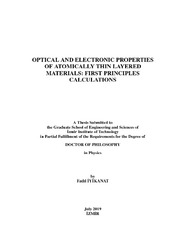Please use this identifier to cite or link to this item:
https://hdl.handle.net/11147/7421Full metadata record
| DC Field | Value | Language |
|---|---|---|
| dc.contributor.advisor | Senger, Ramazan Tuğrul | - |
| dc.contributor.advisor | Şahin, Hasan | - |
| dc.contributor.author | İyikanat, Fadıl | - |
| dc.date.accessioned | 2019-12-04T08:42:21Z | |
| dc.date.available | 2019-12-04T08:42:21Z | |
| dc.date.issued | 2019-07 | - |
| dc.identifier.citation | İyikanat, F. (2019). Optical and electronic properties of atomically thin layered materials: First principles calculations. Unpublished doctoral dissertation, Izmir Institute of Technology, Izmir, Turkey | en_US |
| dc.identifier.uri | https://hdl.handle.net/11147/7421 | - |
| dc.description | Thesis (Doctoral)--Izmir Institute of Technology, Physics, Izmir, 2019 | en_US |
| dc.description | Includes bibliographical references (leaves: 122-146) | en_US |
| dc.description | Text in English; Abstract: Turkish and English | en_US |
| dc.description.abstract | The extraordinary interest in two-dimensional (2D) materials is increasing day by day. Thanks to advances in the experimental techniques, monolayer form of another material is synthesized every day with features not seen in the bulk form. Ab initio methods provide useful tools for characterizing and functionalizing the various properties of these materials. The results obtained through first principles quantum-mechanical calculations can help to predict and understand the experimental data, such as the position and source of the spectroscopic peaks in the Raman or optical absorption spectra. The aim of this thesis is to predict and functionalize the optical and electronic properties of atomically thin layered materials using density functional theory and approaches beyond. Within the scope of this thesis, possible technological applications of various 2D materials ranging from perovskite crystals to transition metal dichalcogenites are investigated by using several functionalization methods. In order to accurately predict the optical properties of these materials, it is very important to use approaches that take into account the many-body effects. Recent studies have shown that many-body perturbation theory in the form of GW approximation is highly reliable to calculate the quasiparticle properties of materials. By solving the Bethe Salpeter equation on top of GW calculation, the quasiparticle energies and excitonic properties, which have dominant effect in the optical properties of ultra-thin materials are examined in detail. | en_US |
| dc.description.abstract | İki boyutlu (2B) malzemelere olan olağanüstü ilgi gün geçtikçe artmaktadır. Deneysel tekniklerdeki gelişmeler sayesinde, her gün yeni bir malzemenin tek tabaka formu yığın formunda görülmeyen yeni özellikler ile sentezlenmektedir. İlk prensip yöntemleri, bu malzemelerin çeşitli özelliklerini karakterize etmek ve işlevselleştirmek için kullanışlı araçlar sağlamaktadır. İlk prensip kuantum-mekanik hesaplamaları ile elde edilen sonuçlar Raman veya optik soğurma spektrumlarındaki pik pozisyonları ve bunların kaynağı gibi deneysel verilerin tahmin edilmesine ve anlaşılmasına yardımcı olabilir. Bu tezin amacı atom inceliğindeki tabakalı malzemelerin optik ve elektronik özelliklerinin yoğunluk fonksiyoneli teorisi ve ötesi yaklaşımlar kullanılarak tahmin edilmesi ve işlevselleştirilmesidir. Bu tez kapsamında, perovskit kristallerden geçiş metali dikalkojenitlerine kadar çeşitli 2B malzemelerin olası teknolojik uygulamaları bir kaç farklı işlevsellendirme yöntemi ile incelendi. Bu malzemelerin optik özelliklerinin hassas bir şekilde tahmin edilebilmesi için çok-parçacık etkilerini dikkate alan yaklaşımların kullanılması çok önemlidir. Son çalışmalar göstermiştir ki, GW yaklaşımı formundaki çok-parçacık pertürbasyon teorisi malzemelerin sözde-parçacık özelliklerini hesaplamada oldukça güvenilirdir. Oldukça ince malzemelerin optik özelliklerinde dominant etkilere sahip olan sözde-parçacık enerjileri ve eksitonik özellikler, GW hesabının üzerine Bethe Salpeter denklemi çözülerek detaylıca incelendi. | en_US |
| dc.description.sponsorship | TUBITAK (114F397) and TUBITAK ULAKBIM, High Performance and Grid Computing Center | en_US |
| dc.format.extent | xv, 146 leaves | - |
| dc.language.iso | en | en_US |
| dc.publisher | Izmir Institute of Technology | en_US |
| dc.rights | info:eu-repo/semantics/openAccess | en_US |
| dc.subject | 2D materials | en_US |
| dc.subject | Ultra-thin materials | en_US |
| dc.subject | Thin films | en_US |
| dc.subject | Atomically thin layered materials | en_US |
| dc.subject | Ab initio | en_US |
| dc.title | Optical and Electronic Properties of Atomically Thin Layered Materials: First Principles Calculations | en_US |
| dc.title.alternative | Atom İnceliğindeki Tabakalı Malzemelerin Optik ve Elektronik Özellikleri: İlk Prensip Hesaplamaları | en_US |
| dc.type | Doctoral Thesis | en_US |
| dc.institutionauthor | İyikanat, Fadıl | - |
| dc.department | Thesis (Doctoral)--İzmir Institute of Technology, Physics | en_US |
| dc.relation.tubitak | info:eu-repo/grantAgreement/TUBITAK/MFAG/114F397 | - |
| dc.relation.publicationcategory | Tez | en_US |
| dc.identifier.wosquality | N/A | - |
| dc.identifier.scopusquality | N/A | - |
| item.openairecristype | http://purl.org/coar/resource_type/c_18cf | - |
| item.languageiso639-1 | en | - |
| item.openairetype | Doctoral Thesis | - |
| item.grantfulltext | open | - |
| item.fulltext | With Fulltext | - |
| item.cerifentitytype | Publications | - |
| Appears in Collections: | Phd Degree / Doktora | |
Files in This Item:
| File | Description | Size | Format | |
|---|---|---|---|---|
| T001949.pdf | DoctoralThesis | 18.29 MB | Adobe PDF |  View/Open |
CORE Recommender
Page view(s)
448
checked on Mar 31, 2025
Download(s)
636
checked on Mar 31, 2025
Google ScholarTM
Check
Items in GCRIS Repository are protected by copyright, with all rights reserved, unless otherwise indicated.